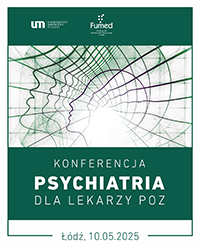Reboxetine in the light of science and clinical practice
Anna Wasik, Marcin Siwek
 Affiliacja i adres do korespondencji
Affiliacja i adres do korespondencjiReboxetine, the first selective noradrenalin reuptake inhibitor, displays high affinity toward NA transporter and insignificant affinity for 5-HT. Unlike desipramine or imipramine, reboxetine shows low affinity for muscarinic, histaminergic and adrenergic receptors. Reboxetine has linear pharmacokinetics in young, healthy males for single doses of 1–5 mg. Reboxetine is well absorbed after oral administration. The absolute bioavailability is 94.5%, and peak levels are generally achieved within 2 to 4 hours after ingestion. Reboxetine has short half life time (13 h), it must be taken twice daily to achieve therapeutic steady plasma level. In vitro studies show that reboxetine is extensively metabolised by cytochrome P450 (CYP) 3A4, with minor involvement of CYP 2D6. Renal and hepatic insufficiency is an indication for reduced (by 50%) daily dosage of reboxetine (4 mg/day). Antidepressant activity of reboxetine was proven in preclinical and clinical studies. Reboxetine induces antidepressant effect in an animal model of depression significantly decreasing the immobility time in Porsolt’s test in mice and rats and locomotor hyperactivity in bulbectomised rats. Reboxetine was approved for the treatment of major depression and dysthymia in Europe, its efficiency and tolerability was assessed during twenty phase 2 and 3 clinical studies. Meta-analyses conducted in last decades prove the efficiency and good tolerability of reboxetine in the treatment of depressed and dysthymic patients. There is a large body of evidence suggesting the potential therapeutic activity of reboxetine in the treatment of resistant depression, poststroke depression, mood disorder within Parkinson’s disease, attention-deficit/ hyperactivity disorder, narcolepsy or nocturnal enuresis.






















